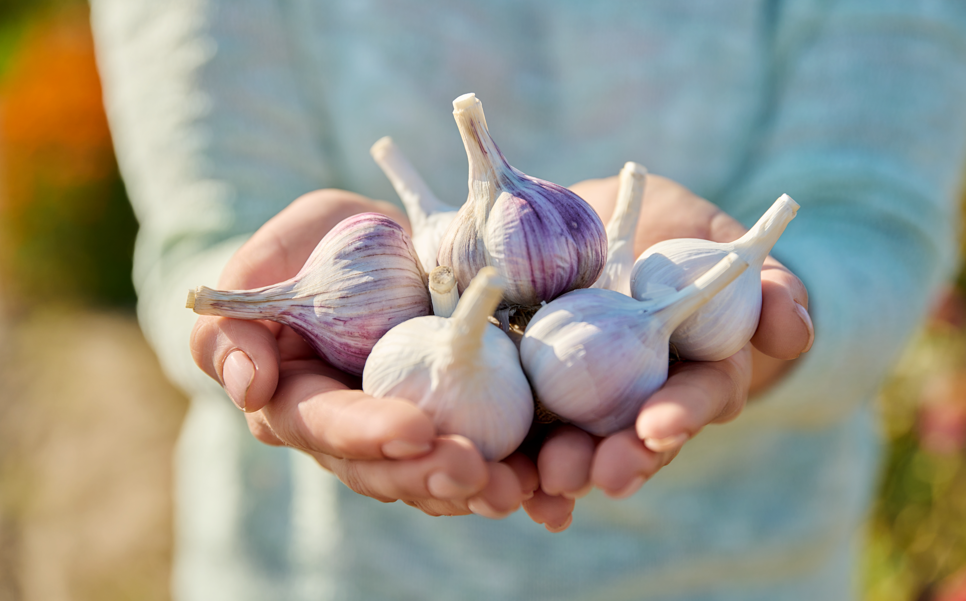This podcast was aired on the Weekends with Joanne Vrakas show on CJAD.
Joanne Vrakas: Garlic Myths Busted: Is raw white garlic a heart booster? Let’s dive in! First question—what exactly makes garlic good for our hearts?
Kim Arrey: Great question! Raw white garlic contains compounds like allicin, which is known for its potential health benefits. Allicin is formed when garlic is chopped, sliced or crushed, and it has been shown to have anti-inflammatory and antioxidant effects. Your heart becomes healthier because inflammation is reduced and there’s less stress from oxidation.
Joanne Vrakas: Interesting! Can you explain how these properties actually benefit the heart?
Kim Arrey: Sure! Allicin helps lower levels of what we refer to as the ‘bad’ cholesterol, that we find in cookies or processed meats for example. We call it LDL cholesterol. It usually accumulates in the heart arteries and can cause heart disease. Garlic also reduces blood pressure, which keeps our heart healthy.
Joanne Vrakas: How much garlic do you need to eat to see these benefits?
Kim Arrey: The amount can vary, but research suggests eating about 1-2 cloves of raw garlic per day can make your heart healthy. But, it’s super important to note that the amount of allicin you’re getting depends on how you prepare the garlic. Crushing or chopping garlic and letting it sit for about 10 minutes before eating increases the amount of allicin produced dramatically.
Joanne Vrakas: Aside from heart health benefits, are there any other health benefits that are associated with eating garlic?
Kim Arrey: There is a whole range of health benefits that are associated with eating garlic. Once review article suggested that taking a garlic supplement is linked to a decrease in respiratory tract infections. And your cold and flu will not be a severe and won’t last as long if you take a garlic supplement or eat garlic. So yes maybe your grandmother was correct. Studies on cancer prevention gave us mixed results, with garlic helping to prevent some cancers but having no effect on others. There are some studies that suggest that garlic might help reduce the inflammation in people with rheumatoid arthritis.
Joanne Vrakas: You mentioned supplements. Are they necessary?
Kim Arrey: In some of the studies, the amount of allicin or concentrated garlic extract used was quite high, and you might not want to eat that much garlic.
Joanne Vrakas: Can I take any garlic supplement?
Kim Arrey: I always suggest asking your dietitian or your pharmacist to check the research and find out the exact brand of supplement that was used to get the benefit that you would like to have. Not all garlic supplements contain the same active ingredient or the same amount of active ingredients so you might not get the same benefit.
Joanne Vrakas: Are there any potential side effects of eating raw garlic or taking a garlic supplement?
Kim Arrey: Eating raw garlic in the recommended amounts is usually safe. However, it can cause gastrointestinal issues like heartburn or upset stomach for some people. Garlic has blood thinning properties, and it can interfere with anticoagulants. Some people are allergic, for people with GI issues it might cause even more upset. You can reduce stomach upset if you eat smaller amounts and gradually increase or have it with leafy greens, carrots, or squash.
Joanne Vrakas: What about bad breath? What are some hacks to remove the garlic breath after eating it raw?
Kim Arrey: Bad breath is actually quite common. Your best solution is to drink water and then chew on parsley, mint, spearmint, or cilantro. Apples, green tea, and lemons are also great at neutralizing the garlic odor if you don’t like herbs.
Joanne Vrakas: What’s the best way to add garlic into your diet?
Kim Arrey: Well you can add it to many dishes like salads, soups, or sautéed vegetables. Some people don’t like raw garlic as it’s too strong. You can always have garlic infused oil instead or even garlic supplements can be considered. Always consult with a healthcare provider before starting any new supplement.
Joanne Vrakas: If we cook garlic, is it still good for our heart health?
Kim Arrey: Absolutely! Now, we’ve already said the best way to eat garlic to have as much allicin as possible is to let the enzymes do its thing by letting garlic sit for 10 minutes. But, if we’re cooking the garlic on high temperature, we’re losing allicin from the heat. Allicin isn’t the only healthy compound in garlic. When you cook it on high heat, there’s something called sulfur and diallyl sulfide in garlic. It’s basically allicin’s twin sister because it also protects our heart by doing the same thing that allicin does! It lowers bad cholesterol and reduces blood pressure.
Joanne Vrakas: Great advice! So from now on I will be letting my garlic sit for 10 minutes before I cook or eat it raw!
Kim Arrey: Yes, and you can even add the garlic towards the end of the dish, so that it’s not exposed to high heat for too long.

